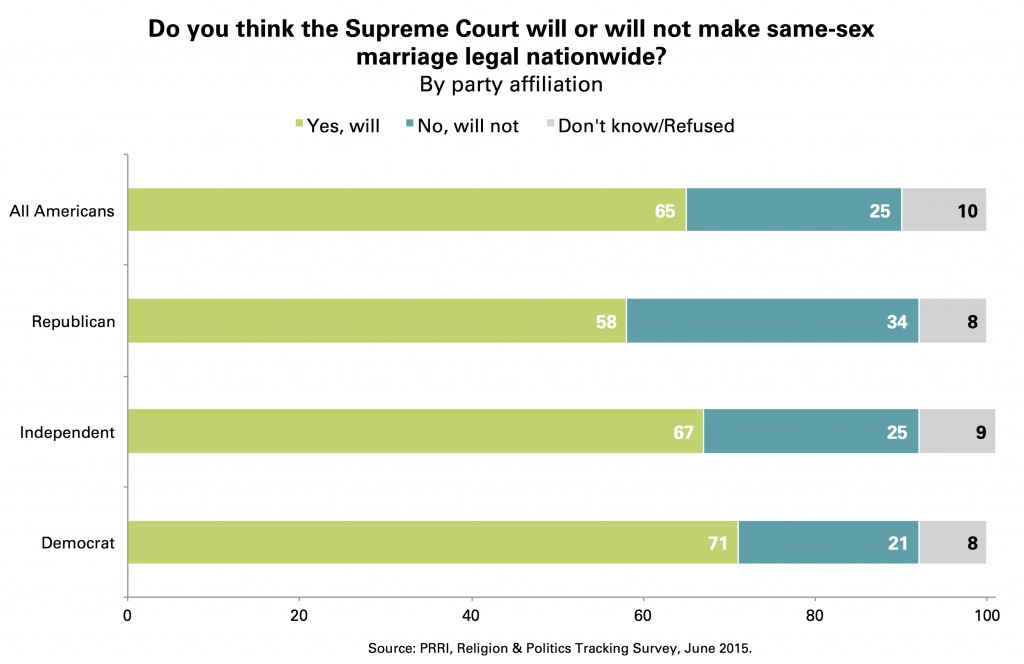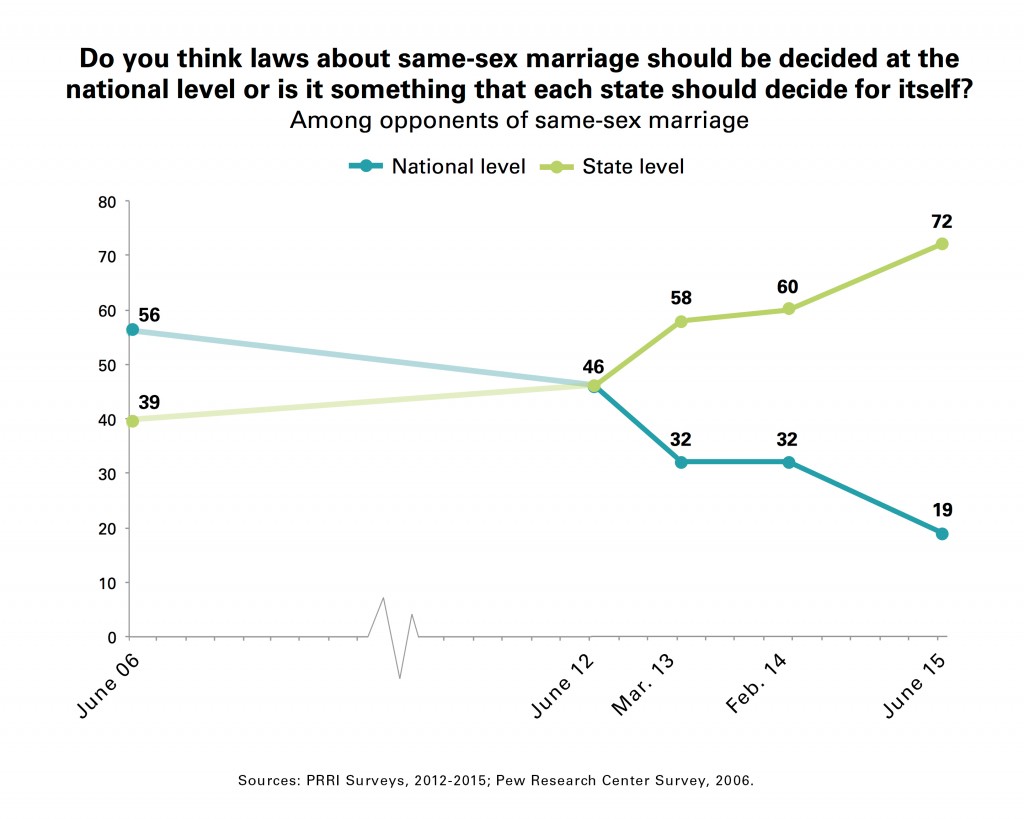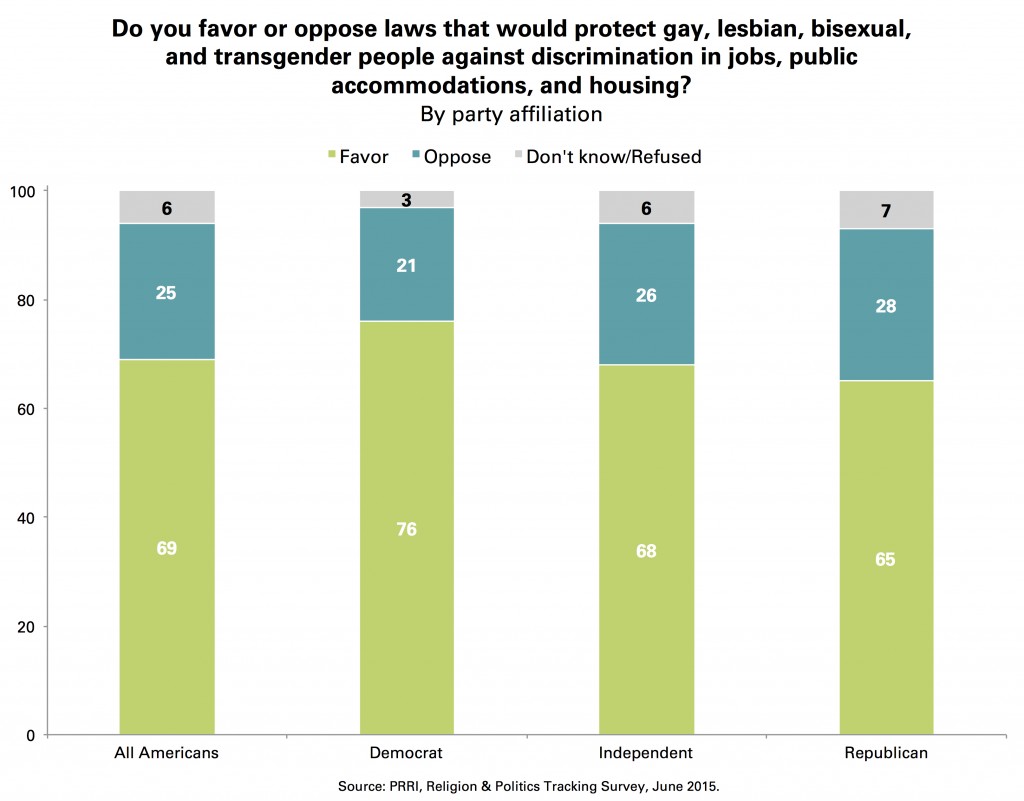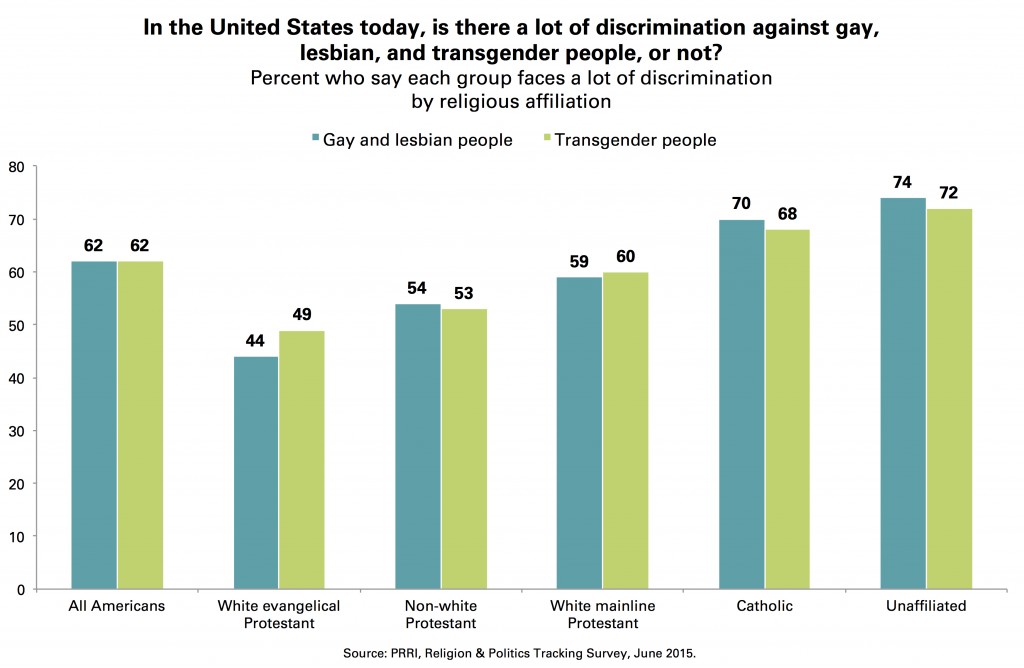I. Most Americans Believe Supreme Court Will Legalize Same-sex Marriage
When the Supreme Court issues its decision on the legality of same-sex marriage at the end of the month, nearly two-thirds (65%) of Americans believe that the court will overturn state bans preventing same-sex couples from marrying and make same-sex marriage legal nationwide. Only one-quarter (25%) of the public says they believe the Supreme Court will leave existing state bans on same-sex marriage intact. One in ten (10%) Americans offer no opinion on the outcome of the Supreme Court ruling.
Predictions on the Supreme Court’s ruling differ sharply between same-sex marriage supporters and opponents. Among those who favor same-sex marriage, eight in ten (80%) believe the Supreme Court will make same-sex marriage legal nationwide. Opponents of same-sex marriage are divided on the outcome. Nearly half (47%) believe that the Supreme Court will legalize same-sex marriage while roughly as many (42%) believe the court will uphold the bans.
Notably, there is general agreement across party and religious lines on how the Supreme Court will rule. Seventy-one percent of Democrats, two-thirds (67%) of independents, and nearly six in ten (58%) Republicans believe that the Supreme Court will legalize same-sex marriage nationwide. Majorities of every major religious group, including 63% of white evangelical Protestants and 60% of Catholics, say they expect the court to make same-sex marriage legal in all 50 states.
II. Same-sex Marriage Opponents Now Say Issue Should be Decided by the States
A slim majority (51%) of Americans say the legality of same-sex marriage should be something that every state decides for itself, compared to 41% who say it should be decided at the national level.
These opinions are tightly linked to support for same-sex marriage. Among those who oppose same-sex marriage, more than seven in ten (72%) say the decision about its legality should be decided at the state level. Conversely, among those who favor same-sex marriage, nearly six in ten (59%) say that the issue should be decided at the national level.
Notably, as support for same-sex marriage has grown in the last decade, opponents and supporters have reversed their positions. In 2006, a majority (56%) of opponents said the decision about the legality of same-sex marriage should be made at the federal level, compared to only 39% who favored a state-level solution. Similarly, in 2006, most supporters (54%) wanted the issue to be left to the states to decide, while 42% preferred a national solution (Pew Forum on Religion & Public Life/Pew Research Center for the People & the Press Survey, August 2006).
Republicans are also much more likely to prefer that the legality of same-sex marriage be left up to the states to decide, rather than the federal government (67% vs. 26%, respectively). In contrast, a majority (54%) of Democrats say the decision should be made at the national level. Independents are divided, with roughly as many expressing preference for a national decision (45%) as a state-level one (50%).
III. Generational, Religious, and Partisan Divisions Persist
Fifty-five percent of the public favors allowing gay and lesbian couples to marry legally, while 37% are opposed. Strong generational, religious, and partisan divisions persist on the issue.
Young adults (age 18 to 29) remain among the staunchest supporters of same-sex marriage, while most seniors (age 65 and over) are opposed. More than seven in ten (72%) young adults favor legalizing same-sex marriage, compared to 42% of seniors; a plurality (46%) of seniors oppose legalizing same-sex marriage.
The issue of same-sex marriage continues to divide religious Americans. Majorities of religiously unaffiliated Americans (79%), white mainline Protestants (60%), and Catholics (58%) favor allowing gay and lesbian couples to marry legally. Conversely, only 29% of white evangelical Protestants and 35% of non-white Protestants support making same-sex marriage legal; majorities of white evangelical Protestants (62%) and non-white Protestants (54%) oppose.
Republicans stand apart from Democrats and independents on this issue. Two-thirds (67%) of Democrats and nearly six in ten (59%) independents favor allowing gay and lesbian couples to marry legally. Fewer than four in ten (37%) Republicans support legalizing same-sex marriage, while nearly six in ten (57%) oppose.
IV. Strong Support for Discrimination Protections for LGBT People
Nearly seven in ten (69%) Americans favor laws that would protect LGBT individuals against discrimination in jobs, public accommodations, and housing, compared to 25% who oppose such policies.
There is broad support across partisan lines for laws that would protect LGBT people from discrimination. Seventy-six percent of Democrats, 68% of political independents, and 65% of Republicans favor laws that would protect gay and lesbian people from discrimination in jobs, public accommodations, and housing.
There is also a consensus across the religious spectrum. Fifty-nine percent of non-white Protestants, 60% of white evangelical Protestants, 67% of white mainline Protestants, and 71% of Catholics favor nondiscrimination laws for LGBT people. Among religiously unaffiliated Americans, more than eight in ten (81%) support nondiscrimination laws.
V. Few Support Allowing Small Businesses to Refuse Service to Gay and Lesbian People on Religious Grounds
Six in ten (60%) Americans oppose allowing a small business owner to refuse products or services to gay and lesbian people, even if doing so violates their religious beliefs, while 34% support such a policy.
While majorities of most religious groups oppose these so-called “religious freedom” laws, white evangelical Protestants (51%) are the only religious group with majority support. Forty-two percent of white evangelical Protestants oppose allowing small businesses to refuse products or services to gay and lesbian people on religious grounds. By contrast, 59% of white mainline Protestants, 63% of non-white Protestants, and 64% of Catholics oppose allowing small business owners to refuse service to gay and lesbian people on religious grounds, as do nearly three-quarters (73%) of religiously unaffiliated Americans.
VI. Most Americans Say Gay, Lesbian, and Transgender People Face a Lot of Discrimination
More than six in ten Americans say that gay and lesbian people (62%) and transgender people (62%) face a lot of discrimination in American society. These numbers are down from February 2014, when roughly seven in ten Americans said that they believed gay and lesbian people (68%) and transgender people (71%) face a lot of discrimination in the U.S.
There are important differences in perceptions of discrimination by political affiliation, religious affiliation, and age.
Three-quarters (75%) of Democrats and roughly six in ten (61%) independents say there is a lot of discrimination against transgender people, while half (50%) of Republicans say the same. Nearly four in ten (39%) Republicans say transgender people do not face a lot of discrimination in America today and eleven percent offer no opinion. Political divisions on perceptions of discrimination faced by gay and lesbian people are similar.
With the exception of white evangelical Protestants, most religious groups believe that transgender people face a lot of discrimination, including a majority of non-white Protestants (53%), white mainline Protestants (60%), Catholics (68%), and the religiously unaffiliated (72%). In contrast, only 49% of white evangelical Protestants agree that transgender people face a lot of discrimination in society, while 37% say that they do not. Fifteen percent of white evangelical Protestants offer no opinion. The pattern of views among religious groups about discrimination faced by transgender people mirrors that of gay and lesbian people.
Young adults are much more likely than older Americans to believe that gay, lesbian, and transgender people face a lot of discrimination in the U.S. today. Roughly seven in ten young adults say that gay and lesbian people (70%) and transgender people (73%) face a lot of discrimination. In contrast, fewer seniors believe that gay and lesbian people (56%) and transgender people (53%) face a lot of discrimination in the U.S. today.
VII. Few Have Close Friend or Family Member Who is Transgender
Nearly two-thirds (65%) of Americans report having a close friend or family member who is gay or lesbian. Substantially fewer Americans report having a close friend or family member who is bisexual (35%) or transgender (11%).
Young adults are more than twice as likely as seniors to say they have a close friend or family member who is transgender (19% vs. 7%, respectively) or bisexual (50% vs. 19%, respectively). Younger adults are also more likely to have a close friend or family member who is gay or lesbian (70% vs. 52%, respectively).
Recommended citation:
Jones, Robert P., and Daniel Cox. “Most Americans Support Same-sex Marriage and Believe Supreme Court Will Rule to Legalize. PRRI. 2015. http://www.prri.org/research/survey-majority-favor-same-sex-marriage-two-thirds-believe-supreme-court-will-rule-to-legalize/.






